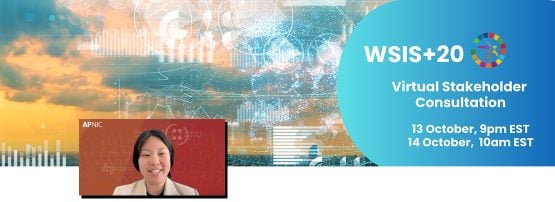
APNIC welcomes the publication of the WSIS+20 Zero Draft (PDF) and appreciates the opportunity to contribute to this important review process. As the Regional Internet Registry (RIR) for the Asia Pacific, APNIC remains committed to the WSIS vision — supporting inclusive, sustainable digital development through responsible stewardship of Internet number resources, technical capacity building, and active participation in multistakeholder governance.
Strengthening Internet governance
The Zero Draft rightly acknowledges the importance of a global multistakeholder approach to Internet governance. APNIC supports this recognition and reiterates that effective governance depends on the meaningful participation of all stakeholders, including governments, international organizations, civil society, the private sector, academia, and the technical community.
Central to this model is the Internet Governance Forum (IGF). APNIC strongly supports a permanent mandate for the IGF, along with sustainable resourcing for its Secretariat. The IGF’s open, bottom-up structure has proven essential for fostering dialogue and collaboration on Internet policy issues. National and Regional Initiatives (NRIs) further extend this impact, enabling locally relevant discussions and solutions. These platforms must continue to be recognized and supported.
Bridging the digital divide
While connectivity has improved across the globe, significant gaps remain, particularly in affordability, digital literacy, and access to emerging technologies. APNIC recommends that the WSIS+20 outcome document explicitly promote IPv6 deployment as a key enabler of future Internet growth.
With the depletion of the available pool of IPv4, IPv6 offers the scale needed to connect billions of new users and devices. Without it, developing regions risk higher costs and reduced access to innovation. Economies like China and Viet Nam are leading the way with national IPv6 strategies, demonstrating how policy can drive meaningful progress.
Bridging the divide also requires community-driven infrastructure. Local networks designed and maintained by communities, especially in rural, remote, or island regions, offer sustainable solutions where commercial investment may be limited. Initiatives like Net2Home in Thailand and artisan connectivity projects in Bangladesh show how Internet access can empower communities economically and socially.
Internet Exchange Points (IXPs) also play a vital role. By keeping traffic local and enabling peering arrangements, IXPs reduce costs, improve performance, and enhance resilience. Their contribution to a more accessible and robust Internet should be reflected in the WSIS+20 outcomes.
Investing in technical capacity
Capacity development must go beyond digital literacy. Technical skills are essential for communities to not only access the Internet but also manage and secure their digital environments. APNIC recommends that the WSIS+20 review strengthen its focus on technical capacity building.
This includes training network operators, supporting local Network Operator Groups (NOGs), and fostering communities of practice. APNIC’s work in this space, through fellowships, mentoring, and peer-to-peer knowledge sharing, helps ensure that skills are retained locally and passed on across generations.
Looking ahead
As the WSIS+20 review shapes the next phase of global digital development, APNIC urges stakeholders to prioritize:
- Reinforcement of global multistakeholder cooperation
- A permanent and well-resourced IGF
- Concrete measures to bridge digital divides through IPv6, community infrastructure, and IXPs
- Stronger recognition of technical capacity development
The Internet must remain open, global, interoperable, stable, and secure, and it must serve all communities, everywhere. The decisions made through WSIS+20 will help determine whether that vision becomes reality.
Joyce delivered the APNIC statement at the UN WSIS+20 Consultations with Stakeholders and Member States on 13 October 2025.
You can learn more about the WSIS+10 Review, browse the related documents, and read APNIC’s full written input to the WSIS+20 Review Zero Draft.
The views expressed by the authors of this blog are their own and do not necessarily reflect the views of APNIC. Please note a Code of Conduct applies to this blog.

Appreciation for APNIC Statement on WSIS+20:
Dear Joyce Chen and APNIC Team,
Assalamu Alaikum.
I sincerely appreciate your detailed statement on WSIS+20 and the emphasis on inclusive, sustainable digital development in the Asia-Pacific region. Your points on strengthening multistakeholder Internet governance, bridging the digital divide through IPv6 and community-driven infrastructure, as well as fostering technical capacity development, resonate deeply with ongoing initiatives in Bangladesh.
As a stakeholder engaged in advancing national ICT systems and digital public services, I find APNIC’s recommendations highly relevant. In particular, the focus on Internet Exchange Points (IXPs) and community-led networks offers practical pathways to enhance connectivity, reduce costs, and empower local communities.
Thank you for your continued leadership and insightful contributions toward a more open, secure, and globally interoperable Internet. I look forward to following APNIC’s ongoing work and exploring opportunities for collaboration to further strengthen Internet governance and capacity in our region.
With regards,
Md. Selim Reza
Bangladesh